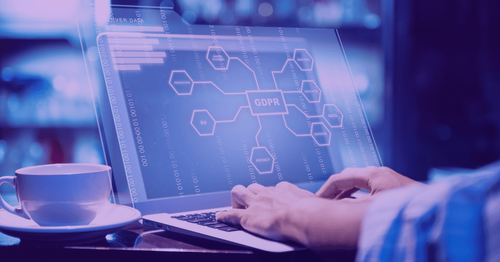How Data-In-Use Encryption Supports Organisations with GDPR Compliance
Let's talk about GDPR and how encryption can help your business be compliant and your data safe!

Data breaches are a major concern for organisations. From hacking to phishing and insider threats, the leak of sensitive data has severe consequences, not only in finances. We're talking about reputational damage, loss of customer trust, and legal liabilities that can last a lifetime. With breaches increasing in every industry and we move toward a world where every human will have' privacy traces' online, data privacy tackles a real-world issue: ensuring that our most sensitive data is indeed protected by the entities that handle them and not easily stolen and used by cybercriminals.
"Data security is not only one of today's hot topics but also the topic of tomorrow." - Rinki Sethi, Board Director at Vaultree.
The General Data Protection Regulation (GDPR) is a comprehensive data protection regulation established and implemented by the European Union (EU) on May 25th 2018, to protect the personal data of individuals within the EU.
Aimed at giving individuals more control over their personal information and ensuring that organisations take all the appropriate data protection measures within the EU and/or when processing the personal data of European Union individuals.
The maximum fine for non-compliance with GDPR is 4% of an organisation's annual global revenue or €20 million, whichever is greater. Most businesses can't afford the cost of a breach, and most probably can't afford the cost of not being GDPR-compliant, especially small and medium-sized businesses.
How the tech industry has been responding to GDPR
While there are still concerns and discussions on how GDPR should protect data, those have long reached even big tech companies, especially in cases of behavioural advertising. For example, a call for the suspension of Facebook's data exports still has yet to land a final decision. Companies like Apple, Tik Tok and Twitter all have GDPR cases that have resulted in massive discussions between EU privacy campaigners, legal experts, users, tech and marketing professionals on how far an organisation can go when handling people's data. The public has been questioning GDPR enforcement and, more importantly, if the industry is walking towards the point where no one is big enough to surpass the rules.
For example, following the Irish Council for Civil Liberties (ICCL) action, the European Commission has recently announced that it will start regularly monitoring all "large-scale" GDPR cases across the EU. That means checking how long each step in a case is taking and what authorities are doing to progress.
"I think it makes the GDPR real", Dr Johnny Ryan, ICCL Senior Fellow, told TechCrunch.
How an organisation can ensure compliance with GDPR
With the significant increase in the number of reported data breaches in the past few years, complying with GDPR whilst reducing the risk of costly data breaches is the number one rule when taking the necessary steps to secure personal data. The GDPR introduced data protection principles for companies handling personal data, including purpose limitations, lawfulness, data minimization, confidentiality, accuracy, accountability, and more. More than a commitment, becoming GDPR compliant and taking a preventative approach towards security require organisational-level tactics and actions, such as:
- Strong security measures
- Practical and constant employee training
- Clear security protocols
- Use of cutting-edge technology, such as data-in-use encryption
The use of encryption in GDPR
Encryption itself is not GDPR mandatory but strongly recommended. It does not prevent a data breach since there's no technology to stop or prevent it entirely. However, data encryption, including data-in-use encryption, can play a critical role in protecting personal data and reducing the impact of a potential data breach.
By encrypting data in use in a fully functional way, companies can guarantee that only authorised users will be able to access & process sensitive data, as well as ensure that the encrypted data is processed securely & accessed by third parties. Can you imagine a company saying, "we suffered a leak, but nobody needs to worry since our data was encrypted and, therefore, fully protected? Encryption plays such a role since a leak of encrypted data is still a leak, but encrypted data is useless to criminals.
How Vaultree's encryption solution unlocks value and directly helps organisations be compliant?
Vaultree has made several breakthroughs in encryption technologies, such as Fully Homomorphic Encryption, allowing for the only Fully Functional Data-In-Use Encryption solution with no complex intermediaries or noticeable delays in the data processing. By unlocking the potential of encrypted data, companies can use their sensitive data to build and develop systems that prioritise privacy without sacrificing compliance with GDPR.
Vaultree's solution helps businesses comply with GDPR by maintaining data encrypted even during usage (processing), not just in transit or at rest, contributing to organisations' data protection by design and default. It means data is not misused or breached, even in the event of a leak. With our plug-and-play SDK, it's possible to quickly migrate and encrypt databases through a very intuitive graphical user interface. It allows you to process and search encrypted data by replacing the database driver in the application source code, creating a secure layer between the user and stored data. In our solution, all the data, code and keys are safe, in standalone servers or the cloud, without third parties needing to manage and guarantee all the encryption infrastructure.
Check how it works, and talk to our team to find out more.
More from our blog
Vaultree: Bulletproof Your Business from GDPR Breach Disclosures and Fines
Transform compliance into a significant competitive advantage - business challenges now become opportunities for growth and innovation
Cybersecurity in 2023: What can we expect?
It's a new year, but how will the infosec industry respond with cyberattacks on the rise?
How can blockchain help prevent cybercrime?
Let's talk about Blockchain and the kinds of standards that can help keep organisations and their data safe.


